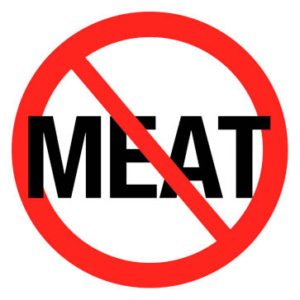 “… but I am a great eater of beef, and I believe that does harm my wit.” (Twelfth Night act 1 sc. 3)
“… but I am a great eater of beef, and I believe that does harm my wit.” (Twelfth Night act 1 sc. 3)
Tips for Use. Make the quote part of an introduction when promoting the value of vegetarianism. Or quote to justify your vegetarian life-style and why you may refuse the meat offered at a meal or banquet.
The up-loader of the blogs in this site is a practicing vegetarian. It is now well established that we can get all the nutrition we require from vegetables. Here in Portland, Oregon there is a young, growing and active Vegetarian Association (NW Veg). Mothers can now display very healthy children who never tasted meat in their life. As many know, our reliance on meet has deep roots that have nothing to do with nutrition or health. In the not distant past, meat was the prerogative of the wealthy. Consequently, in the collective mind the notion has remained that partaking of meat is an index of wealth. That this is not so, we can read or document ourselves on the immense harm done to the collective health by McDonald base nutrition. Besides, wealthy medieval lords and kings used to die of degenerative diseases and gout, directly attributable to their meat-based nutrition.
The acknowledged founder of vegetarianism was Pythagoras In antiquity the last known apostle of vegetarianism was Porphyry (born in 232 AD), a Neo-platonist philosopher who said, “…some animals may eat men through want and hunger, but we do so from insolent wantonness and luxurious pleasure amusing ourselves as we do also in the circus and in the murderous sports of the chase. By thus acting, a barbarous and brutal nature becomes strengthened in us, which renders men insensible to the feeling of pity and compassion.” This was just before the advent of Emperor Constantine. Christianity brought in the Judaic tradition with its opposition to concepts like justice and non-violence towards animals and to vegetarianism itself. Vegetarianism did not die completely. Suffice to mention the Venetian Luigi Cornaro, (1484-1586) a centenarian who wrote his “Art of Living Long” when he was well over 80 years old. And even Milton says in “Paradise Lost”,
“Some, as thou saw’st, by violent stroke shall die,
By fire, flood, famine; by intemperance more
In meat and drinks, which on the Earth shall bring
Diseases dire…”
To receive an (almost) daily link to the latest blog and Shakespearean ‘weapons’ enter your details in the contact form. And I promise, no sales calls, trade leads, venomous schemes, hidden plots, commercial ploys, psychological tricks, leads exchanges, barter proposals, suggestions or offers of any kind imaginable (and unimaginable).
Of course, if you acquire the book “Your Daily Shakespeare” you will not only enjoy it but you will find it very useful. After all Shakespeare wrote it, I simply compiled it to make Shakespeare very “user friendly” as they say. And if you wish I will even sign it. But this is the extent of any “sales” effort, call or solicitation.
In the play. Aguecheek suspects that his loss of wit is attributable to an excessive accumulation of proteins.
Original image from http://www.celestialhealing.net/physicalveg3.htm
